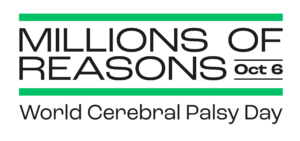Guest blogger, Emily Kachenko, meets the impressive young Nick Schumi from Adelaide in South Australia.
World Cerebral Palsy Day is a social movement, of, by and for the CP community. Its vision is to ensure that everyone with CP has the same rights, access and opportunities as anyone else. Let’s meet Nick Schumi who has been advocating for these things in the lives of people living with a disability for many years.
Nick is an Adelaide man who is passionate about empowering young people with a disability to reach their full potential. Nick has cerebral palsy and is qualified in youth and social work, specializing in the disability space. These days, among many other things, Nick is both an employee and participant of Immersion Therapy, with Determined2, a world first way in which people with injury or disability can have access to water based movement, with the use of SCUBA equipment, allows benefits like never before.
For many years Nick has been a keen contributor to advisory committees, advocating to have the voices of young people with a disability heard. Around 10 years ago, Nick signed up to attend a forum on the experiences of young people with a disability held by the Julia Farr Association (JFA Purple Orange) …along with only one other person. Disappointed by the low turnout, Nick offered to reorganise the event. This time 12 people attended. At the meeting, fruitful discussions identified what was important to these young people and what services were and weren’t working. The forum also identified a need for a peer support program between people with a lived experience of disability. Nick says the program was needed as there was nothing similar available to help people live inclusive lives and develop to their full potential.
Unfortunately, it was the experience of many participants that while they were asked for their input at similar forums, the implementation of concrete programs to address the issues raised was less likely to happen. Nick was ready to change this trend. When the opportunity to implement the program presented itself, Nick threw himself into organising it.
After around two years of planning, Julia Farr Youth Mentoring was launched. This program offers peer-to-peer support for young people living with disability. The mentee (aged between 11 and 18) is mentored by a mentor (aged between 18 and 30) who also lives with disability. A mentor and mentee will catch up a couple of hours each fortnight to do things they are both interested in, such as watching a movie, playing video games, playing sport, getting a bite to eat or going to a park. Sometimes there are specific goals, such as practising catching a bus or transitioning from primary to high school or to life after high school. A mentee/mentor relationship can last between four and 12 months, or longer depending on the relationship.
After the hard work of planning, Nick was ready to be a part of the first mentor/mentee relationship and began by mentoring a young boy living with cerebral palsy. This boy was making the transition from primary school to high school, which involved leaving his friendship group as the new school his friends were attending was not able to accommodate him.
Nick was able to get to know the mentee’s family and tells the story of how after having dinner with the family for the first time the boy’s mother asked Nick if he had noticed that the boy had used his cutlery? Nick had noticed. The boy’s mother explained that usually her son started the meal using knives and forks but, due to dexterity issues and involuntary movements, usually asked someone to help him. The mentee finished his meal using his cutlery, with his Mum attributing this to the motivating presence of Nick, who was a little bit older, navigating a similar lived experience and relating to her son at his level.
Nick admits when first becoming a mentor he had some self-doubt, wondering whether he had something to offer. These doubts were soon forgotten, with Nick being able to help his mentee in practical and meaningful ways. This included getting the appropriate clearances to accompany his mentee to his new high school to help him make new friendships in his new environment. As Nick says, “not just talking, but doing”. This points to an added benefit of the program, with mentors also gaining a sense of achievement from their involvement. Mentors also regularly get together to learn new skills and to share their mentoring experiences.
Since this first mentor-mentee relationship there have been dozens of others. Nick is no longer involved directly with the program, (other than as a ongoing consultant for other projects) having passed on his knowledge and experiences to others, empowering them to continue the work of the program. Nick says the program is a success as the young people themselves are in control of its direction. Young people with a lived experience of disability continue to be involved in all aspects of the program ensuring it remains as relevant as possible.
When asked whether he has any tips for other people wanting to create a similar program, Nick says it is important to give young people with a disability the space to create programs which are meaningful to them. He also wisely says that it is important to get these programs right, as it is young people’s lives, after all.



